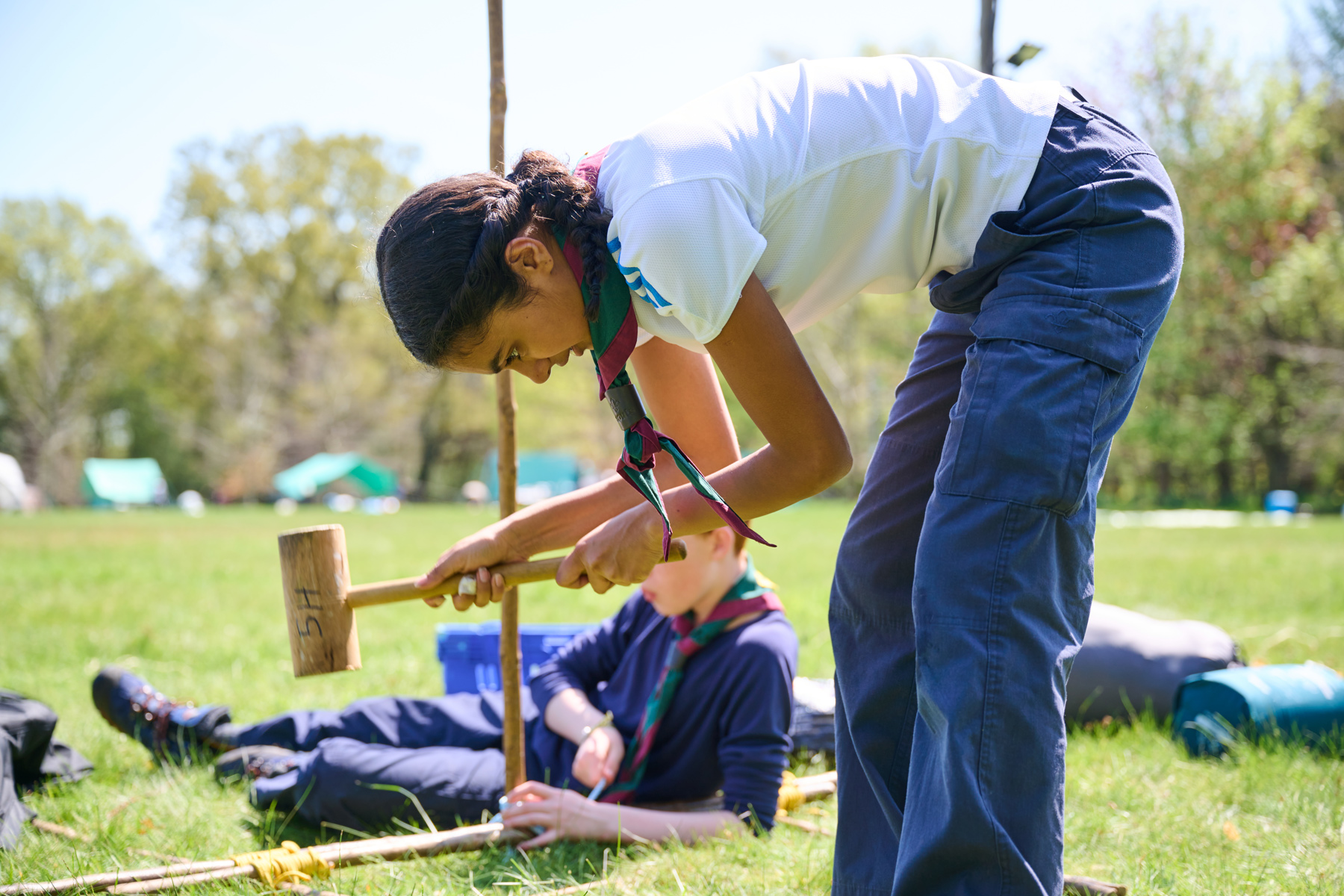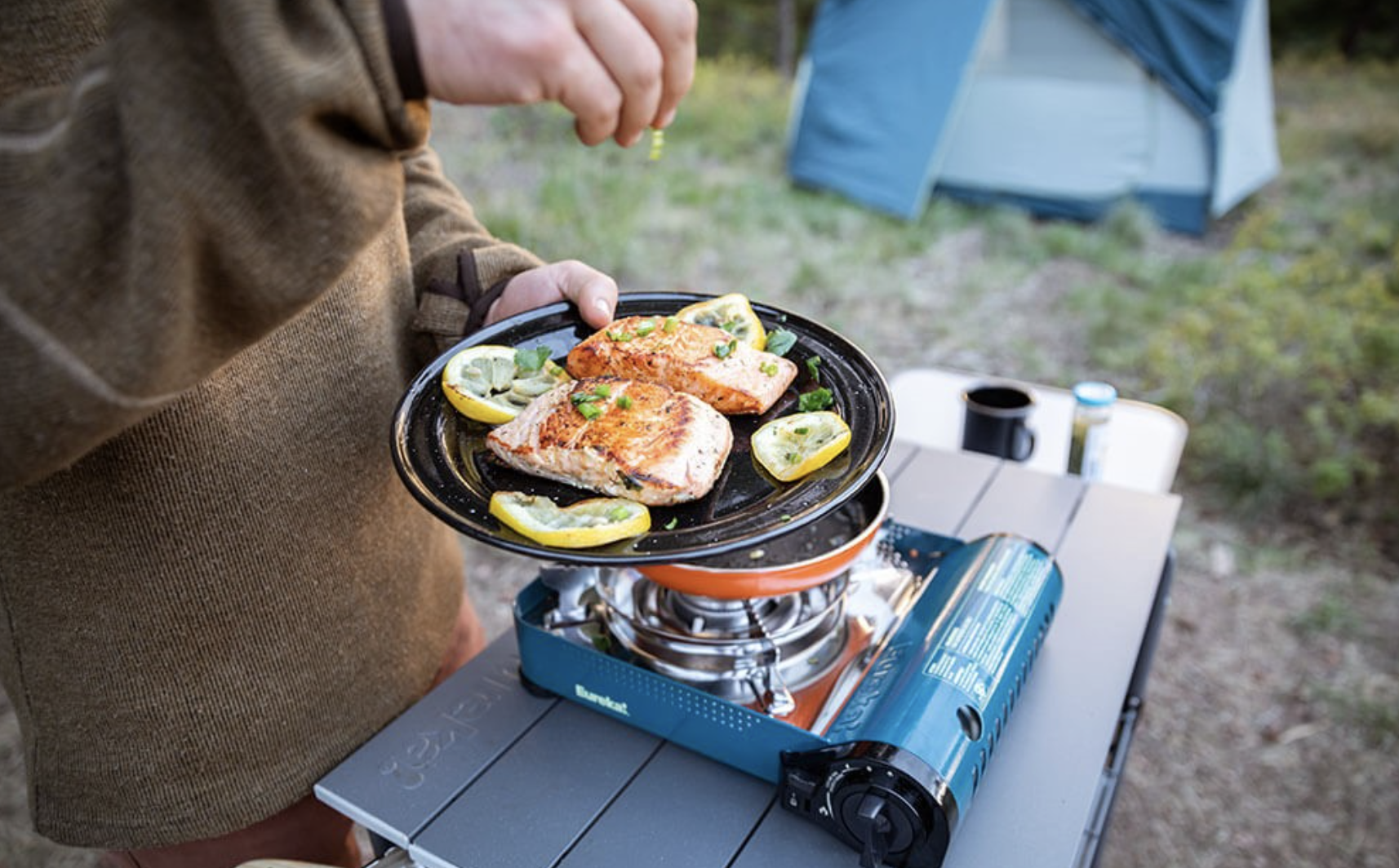20 top tips to go camping on a budget with HSBC UK
Planning big nights away on a small budget is not as hard as it sounds. We’ve joined with our partner, HSBC UK, to put together some money-saving tips to help you keep the costs down on your next adventure.
You don’t need to travel for hundreds of miles to an exotic location in the middle of nowhere to have an amazing outdoors experience, as adventure can be found on your own doorstep.
Remember, you can also get our Scouts discount at GO Outdoors to save you some pennies.
With help from our partner, HSBC UK, we’ve put together our top 20 tips to help you go camping on a budget:
See if you can borrow kit you need from family, friends, rental shops or neighbours.
Buying great quality camping brands second hand means your equipment be safe, durable and long-lasting at a fraction of the price.
Try and repair any broken kit before replacing it. For example, you may be able to replace a guy rope if that’s all you need, rather than buying a whole new tent.
You don’t need lots of equipment or the latest camping kit, so keep it simple and only take what you really need. You’ll have less to carry too.
Research and look for basic campsites with smaller fees - or even free ones!
If you can, travel outside of peak times, which are usually school holidays or bank holidays. It’ll likely be cheaper and quieter.
Split the cost and share the fun by camping with others. You can share the price of food, fuel or even equipment.
Rather than buy a blanket or cutlery set just for camping, see what you can bring from home. You can probably use the same kitchen equipment, such as utensils, condiments and tea towels.
Invest in reusable items, such as reusable barbecues, rechargeable batteries and water bottles.
After you use it, make sure to dry your tent out thoroughly and store it correctly with all the tent pegs. Looking after all your equipment by cleaning, maintaining and storing it correctly will help save money in the long run.
Try to stay away from tourist areas for cheaper prices.
There are lots of free or low-cost activities, such as nature reserves, museums, swimming, mini golf and beach trips.
You may be able to find some discounts too, such as through work, Tesco Clubcards or Blue Light Cards.
Two nights away comfortably is better than worrying about the cost of four nights, so think about what’s achievable and keep your plans realistic.
Wherever you decide to go, it’s best to plan the trip well in advance, so you can allow plenty of time to have the money needed ready.
You may want to try and budget your trip based on similar itineraries, previous costs, or rough estimates.
Staying local helps to reduce the cost of fuel and transport, so explore the nearby beauty of the world around you.
You could even have a staycation, camp in your garden or living room, and discover new things in your local area.
Choose to go somewhere on a bus or train route, as it may help to keep travel costs down. You may be able to find a campsite with free shuttle buses to the local area too.
If you can, take your bike. It’ll help you to get around the campsite and the local area easily. A bike ride is a great day trip too!
If you plan on taking a bike, remember to also pack your helmet, bike lights, visible clothing, a bike lock and puncture repair kit.
Some campsites have swimming pools, sports fields, boating lakes, quiz nights, entertainment or playgrounds. You might need to hunt harder for the activities you’ll need, but it should help keep costs down and can be more convenient.
At the end of your trip, go back to your original food list and write down what you used, ran out of and had left over.
You’ll have a comprehensive list of what to buy and exactly how much of it you’ll need for next time if you want to go again.
Making a meal plan means you’ll know what food to buy and can avoid overspending. It’s important to think about how you’ll transport, store, prepare and cook the food, especially if your cooking options are limited.
It’s best to stick to simple meals you can make on a camp stove or barbecue. Take a look at our carbon monoxide guidance.
When you have your kit list, menu or food plan, start buying throughout the year when you see offers on camping gear or non-perishable items. Just remember to check any use-by dates.

12 bonus tips to run a Scout camp on a budget
Think about letting your young people run their own tuck shop. It’ll give them a project to get stuck into and may help raise some funds!
See if a local business would sponsor any places on camp for anyone who needs financial support. Take a look at our advice on fundraising, grants and gift aid to help make camp affordable to everyone.
Consider if there’s space to camp at a local Scout-owned meeting places or Scout campsites, which may lower costs. You may be able to even stay there for free. This is a great choice for younger sections, who may be worried about being too far away from home.
Try talking to local campsites – they may be able to provide some space at a discounted rate.
Try contacting local businesses for discounts. Lots of volunteers have done this and found success!
Be upfront and polite then see what they offer. Remember, they may say no and that’s OK.
Put the word out to parents and carers, or to other volunteers, to say you’re after certain skills or activities.
From yoga and stargazing, to bushcraft and football, there may be a few willing people who can come along to your camp and offer up their skills for the day.
There are lots of free or low-cost activities that can cater for all ages of Scouts, such as playing football on a field, capture the flag or going on a nature scavenger hunt.
Take a look at our free activities, as well as our activities with no equipment and activities with very little equipment.
At the same time, remember to stick to a balanced programme while you’re away. Therefore, you may want to splash out on one big adventurous activity, such as kayaking or indoor climbing. Always remember to check the safety guidance and permit requirements.
Make sure you plan your activities in advance, as you could get people to provide bring their own supplies, where possible.
For example, everyone could bring their own pencil case. You could also ask people to collect empty water bottles to make rockets, toilet tubes to make puppets or cardboard boxes to make cardboard castles.
See if you can set up a car-share system, so parents and carers don’t have to do more than one journey.
You could also choose a campsite close to a local train station or on a reliable public transport route, so everyone can access it. You could then use public transport throughout the week on camp too.
If you’re going to be travelling a little further, it’s well worth the extra planning and can help lower fuel costs.
Why not invest in a selection of group kit, such as roll mats and sleeping bags, so it can be reused again and again by different people? You could also let people borrow this kit as needed, like a lending library, and share it between sections.
If anyone doesn’t have certain items they need, why not see if you can borrow it for them from another Scout group? Or, you could see if any willing parents and carers have extra items they can share with others? Just remember to check what is covered by insurance.
It’s best to tell people in advance that you’re planning a camp or residential event. You could give them an estimated cost or use a past trip to plan the budget. Some people may need time to save or could use a payment plan, such as a breakdown of payments over six months.

Try our HSBC UK activities and Money Skills badges
Why not practice budgeting and learn about money with our HSBC UK activities and the MoneySkills Beaver or Cub badges?
Learn more about HSBC UK and Scouts